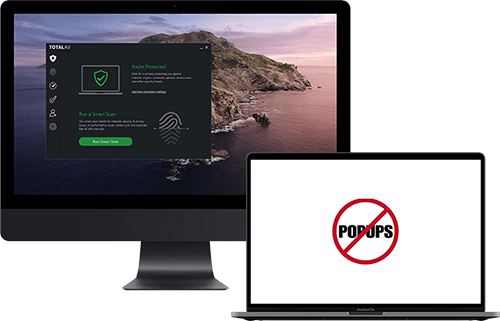Top 5 Best Popup Blockers 2023
Compare the Best Antivirus Software for all your Devices
- Avoid using popup blockers and get rid of annoying ads
- Remove Adware viruses generating popups
- Pop-up protection across all browsers and devices
- Improve your Online Privacy and Safety

2024 Editor’s Pick
1

- #1 Antivirus Provider 2023
- Removes Viruses, Adware, & Malware
- Includes Firewall Protection
- Advanced Ransomware Protection
Available on:

outstanding
2

- Includes Smartphone Antivirus
- Advanced Firewall included in all plans
- Compatible with all operating systems
- Perfect for home users
excellent
3

- Compatible with all devices
- Advanced Firewall included
- Removes Viruses, Adware, & Malware
- Spam & phishing e-mail blocker
Great
4

- One solution to protect your devices
- World-class virus and malware protection
- Includes Smart Firewall and Password Manager
- Darkweb Monitoring powered by LifeLock
5

- One of the most trusted around
- Compatible with all devices
- Perfect for home users
- Advanced Firewall included
#1 2023 Editor’s Pick

FREE
- #1 Antivirus Provider 2023
- Removes Viruses, Adware, & Malware
- Includes Firewall Protection
- Advanced Ransomware Protection
Available on:

2

$29.00
- Includes Smartphone Antivirus
- Advanced Firewall included in all plans
- Compatible with all operating systems
- Perfect for home users
3

$19.00
- Compatible with all devices
- Advanced Firewall included
- Removes Viruses, Adware, & Malware
- Spam & phishing e-mail blocker
4

$34.99
- One solution to protect your devices
- World-class virus and malware protection
- Includes Smart Firewall and Password Manager
- Darkweb Monitoring powered by LifeLock
5

$44.99
- One of the most trusted around
- Compatible with all devices
- Perfect for home users
- Advanced Firewall included
What is an Antivirus Software?
An antivirus is a software program designed to detect and remove malware from a computer or mobile device. Traditional antiviruses scan your files against a built-in malware database, flagging unsafe files that match the database. More advanced antivirus programs use machine learning, heuristic analysis, and cloud-based malware directories to detect and remove zero-day threats and very sophisticated malware. All of the best antiviruses offer real-time protection, so they scan every file before it executes to ensure malware never even starts running on your device.
Why do you need an Antivirus?
In recent years, people have become increasingly reliant on electronic devices. It is crucial now, more than ever, to have adequate security to protect your personal information from viruses and hackers. That’s where antivirus software comes in. Antivirus software, also known as anti-malware, is a computer program used to prevent, detect, and remove malicious software from your computers, tablets, and mobile devices.
There are many different types of malware, viruses being the most well-known. Here we have highlighted some of the lesser-known types of malware that all security-conscious users should be familiar with. To learn more, follow our blog for the latest updates and information.
Disclaimer
AntivirusAdviser’s reviews are the honest opinions of our team of expert cybersecurity professionals. Our reviews are neither paid for nor sponsored by antivirus providers, although we may earn an affiliate commission through some of our referral links.
At AntivirusAdviser, our goal is to provide transparent, informative, and easy-to-understand reviews of antivirus solutions for all devices and operating systems. We hope these reviews will give you the insights needed to make an informed decision about your antivirus purchase.
Why You Should Or Shouldn’t Use Popup Blockers
Even before the internet became popular, we were all actively looking for ways to avoid ads using popup blockers as much as possible. Commercial breaks on TV were used as an opportunity to visit the bathroom or walk the dog.
But commercials on TV no longer bore us with their repetitiveness every hour, but nearly every twenty minutes, and the commercials you might have missed on TV, you can now enjoy again in the supermarket, on the bus, or online. The main drawback is that you cannot ignore those annoying pop-up ads, adware, and banners on websites by simply walking the dog. You will need to bring out the big guns. This is where popup blockers come in.
What exactly is a popup blocker?
As the name suggests, a popup blockers is a program that blocks online popups for you. After the rise of the world wide web, online advertising became even more attractive than advertising on TV. Not only are online ads a lot cheaper, marketers also receive tons of information (your internet use, search queries, surfing behavior), so that targeted advertising were suddenly within their reach.
The rise of online ads also enabled the rise of pop-up blockers. Every disadvantage has its advantage, though. Popup blockers work on almost every device, so on both desktop and laptop, as well as on tablet and smartphone.
This means that both the ads on web pages on your PC and the ads on your smartphone can be blocked.
Why do we use popup blockers?
Website owners are not happy with the rise of ad blockers, as ads are their only source of income. That’s understandable. Worldwide, websites miss out on billions of dollars in revenue every year as nearly one in five internet users is using an ad blocker, and that percentage is ever increasing. When you install an ad blocker, your favorite websites might miss out on income.
Popup blockers to the rescue
So what do we do as consumers? We look away. We try to filter out all those stimuli around us and ignore them where possible. This becomes more difficult online, of course, which causes a lot of inconveniences.
Before you have the opportunity to read the text you have been looking for the last two hours, you must first click away four pop-ups and make your way through ten banners. Otherwise, you don’t even get to read the text.
This way, you are almost forced to view ads before you can use the world wide web. This also means that the freedom that the internet once gave us is gradually being taken away from us. Fortunately, pop-up blockers come to the rescue.
Installing a pop-up blocker protects you from having to see dozens of ads the moment you connect to the interwebs. Unfortunately, it does not mean that you are rid of those annoying pop-ups for the rest of your life.
Still, a great popup blockers will make your browsing experience a lot more pleasant. The purpose of pop-up blockers is to block those annoying, screaming and most irritating ads. This results in ad-free internet, or in some cases replaces these gruesome ads with more subtle, pleasant ones that don’t bother people as much. How many ads are blocked depends on the pop-up blocker you install.
Popup blockers force advertisers to be creative
Downloading pop-up blockers does not guarantee an ad-free virtual life. However, it does provide more appropriate, interesting and sometimes even fun ads.
Advertising agencies around the world are fighting pop-up blockers and see that their screaming ads no longer work. This means that after a long time of annoying pop-ups, they now have to be creative again.
One way to do that is to show in the ad that they know a pop-up blocker is being used. For example, the advertisers behind Netflix devised a specific campaign aimed at the users of pop-up blockers. When visiting the news website The Next Web, they immediately saw an alarming ad with the text: “Hello, pop-up blocker user. You cannot see the ad. But the ad can see you.”
They were then forwarded to the Netflix website.
This creative campaign generated a lot of positive reactions even among pop-up blocker users and shows that not all advertising has to be annoying.
Advertisers are also advised to advertise as much as possible within mobile applications, as this is the one place that’s still immune to pop-up blockers. Certain websites are also made inaccessible unless the pop-up blocker user (temporarily) disables the extension in order to visit the website. When you visit these websites you will immediately see a message with the ‘friendly request’ to turn off your pop-up blocker so that you can view the content.
All in all, pop-up blockers have several advantages. While they may cause a drop in profits for a business, it’s within their control to serve customers a pleasant browsing experience with memorable and non-intrusive ads.
In addition, pop-ups blockers speed up page loading times and improve your privacy online.
But watch out, not every pop-up blocker is equally reliable. Some service providers work with advertisers behind the scenes and are paid to let certain ads pass through the defense.
If you want to find reliable pop-up blockers that make ad-free browsing a breeze, have a look at the brands we recommend above or read their reviews here.
Looking for an ad blocker instead? Make sure to check out our best ad blockers TotalAV
